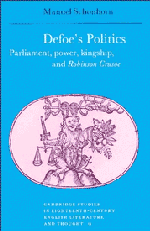Book contents
- Frontmatter
- Contents
- Dedication
- Preface and acknowledgments
- A note on attributions
- List of abbreviations
- Introduction
- 1 Defoe, dissent, and monarchy
- 2 Defoe's Reflections Upon the Late Great Revolution and the political languages of 1689
- 3 Defender of the king, 1689–1701
- 4 From the death of William III to Jure Divino, 1702–1706
- 5 Jure Divino
- 6 The politics of Robinson Crusoe
- Select bibliography
- Index
4 - From the death of William III to Jure Divino, 1702–1706
Published online by Cambridge University Press: 19 August 2009
- Frontmatter
- Contents
- Dedication
- Preface and acknowledgments
- A note on attributions
- List of abbreviations
- Introduction
- 1 Defoe, dissent, and monarchy
- 2 Defoe's Reflections Upon the Late Great Revolution and the political languages of 1689
- 3 Defender of the king, 1689–1701
- 4 From the death of William III to Jure Divino, 1702–1706
- 5 Jure Divino
- 6 The politics of Robinson Crusoe
- Select bibliography
- Index
Summary
On the last day of December 1701, following a moderate Tory election victory in a nation geared for renewed hostilities on the continent, King William addressed his sixth and final parliament. Conciliatory, eloquent, and candid, aware of the “new war” he was to prepare his subjects for and the funds that would be necessary to finance it, he prayed for the cessation of “disputes and differences” and concluded: “I have shewn, and will always shew, how desirous I am to be the common father of all my people.” Ten weeks later, on 8 March 1702, the pater patriae of his adopted nation was dead.
As Defoe intimated in 1700, “real kings” (the phrase is Carlyle's) like William find it easier to rule in times of war than peace. England had not only lost her greatest king in an age of kings – one who was ready and able to temper those unhappy and almost fatal animosities that were dividing the nation at home – it had also been deprived of its mythic military leader at the onset of what was clearly seen to be a major European conflagration. “It was expected that … before the end of April the King was to appear in Holland in order to open the campaign in person.” And the accession of Queen Anne compounded this already disquieting situation, for, as one sympathetic biographer conceded, no other English queen had been “less tutored in queenship.”
- Type
- Chapter
- Information
- Defoe's PoliticsParliament, Power, Kingship and 'Robinson Crusoe', pp. 89 - 123Publisher: Cambridge University PressPrint publication year: 1991



